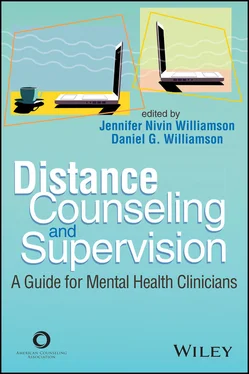Distance Counseling and Supervision
Здесь есть возможность читать онлайн «Distance Counseling and Supervision» — ознакомительный отрывок электронной книги совершенно бесплатно, а после прочтения отрывка купить полную версию. В некоторых случаях можно слушать аудио, скачать через торрент в формате fb2 и присутствует краткое содержание. Жанр: unrecognised, на английском языке. Описание произведения, (предисловие) а так же отзывы посетителей доступны на портале библиотеки ЛибКат.
- Название:Distance Counseling and Supervision
- Автор:
- Жанр:
- Год:неизвестен
- ISBN:нет данных
- Рейтинг книги:5 / 5. Голосов: 1
-
Избранное:Добавить в избранное
- Отзывы:
-
Ваша оценка:
- 100
- 1
- 2
- 3
- 4
- 5
Distance Counseling and Supervision: краткое содержание, описание и аннотация
Предлагаем к чтению аннотацию, описание, краткое содержание или предисловие (зависит от того, что написал сам автор книги «Distance Counseling and Supervision»). Если вы не нашли необходимую информацию о книге — напишите в комментариях, мы постараемся отыскать её.
*To purchase print copies, please visit the ACA website here
*Reproduction requests for material from books published by ACA should be directed to permissions@counseling.org
Distance Counseling and Supervision — читать онлайн ознакомительный отрывок
Ниже представлен текст книги, разбитый по страницам. Система сохранения места последней прочитанной страницы, позволяет с удобством читать онлайн бесплатно книгу «Distance Counseling and Supervision», без необходимости каждый раз заново искать на чём Вы остановились. Поставьте закладку, и сможете в любой момент перейти на страницу, на которой закончили чтение.
Интервал:
Закладка:
When counseling clients who are outside of the United States, it is important to identify the counseling regulations for the counselor’s home state as well as the country and/or region in which the client is living (ACA, 2014). It might be important to identify how mental health services are defined and regulated in the region, as the terms counselor or therapist might have different meanings in different regions. When counselors or clients reside on a military base, the regulations may also be very different. Many U.S. military bases are considered sovereign territory and possess their own regulations regarding licensure. Another factor to consider is where the counseling services are offered, either through a mental health office or through a chaplain’s office. Chaplain or faith-oriented services are sometimes subject to different rules, laws, and regulations, which has implications for confidentiality.
Several resources are available to assist counselors providing telebehavioral health services. ACA provides resources regarding client/counselor residency on their website ( https://www.counseling.org) and specifically in the Government Resources section ( https://www.counseling.org/government-affairs/government-resources-for-counselors).
Assessing Appropriateness for Technology-Assisted Services
Counselors must recognize that not all clients will be well served through telebehavioral health services; therefore, it is imperative for them to assess a client’s appropriateness for technology-assisted services prior to beginning distance counseling. The ACA Code of Ethics states that “counselors make reasonable efforts to determine that clients are intellectually, emotionally, physically, linguistically, and functionally capable of using the application and that the application is appropriate for the needs of the client” (ACA, 2014, Standard H.4.c.). Counselors must recognize that distance counseling services are not appropriate for every client; in those situations, they should consider offering face-to-face services or providing appropriate referrals for those clients. This assessment of client appropriateness should be an ongoing process to ensure the client is using technology in an appropriate manner (ACA, 2014; Stolsmark, 2015). It is important for counselors to assess several categories of appropriateness, including access to and knowledge about technology, counseling space and netiquette, emotional stability, and safety and emergency risk management. It is recommended that counselors meet with clients in person when possible to conduct this assessment, to verify their identity, and to conduct an initial informed consent interview. When an in-person session is not possible, a synchronous videoconferencing session might be appropriate (AMFTRB, 2016). It is important for clients to understand the risks and limits to confidentiality prior to engaging in an initial session using technology. Clinicians should consider the following areas of appropriateness prior to engaging in virtual clinical services with clients.
Access to and Knowledge About Technology
Technology-assisted counseling sessions are most effectively conducted with clients who are very comfortable using similar technologies. It can be risky or stressful to use technology in the counseling session when the client has not used it in the past or when appropriate supports are not in place. In some cases, rural agencies have opted to send out technologists or case managers to assist clients in their homes during initial sessions when they are new to using virtual technology. Other providers have constructed telehealth rooms in their agencies that are monitored by administrative staff to support connections with counselors who are off-site. It is helpful to provide clients with a list of the required technologies prior to the first session. This list might include a computer with the capacity necessary to handle a teleconferencing program, a webcam with microphone, headphones with an integrated microphone, and an Ethernet-accessed internet connection. It is recommended that clients and counselors use Ethernet cables to connect to the internet, as wireless internet may not be secure and risk confidentiality breaches. It is also helpful when both clients and counselors use a virtual private network as a means to secure and protect confidentiality. HIPAA-compliant encrypted software should this time of crisis; however, it also recognized the need to continue to safeguard privacy:
If telehealth cannot be provided in a private setting, covered health care providers should continue to implement reasonable HIPAA safeguards to limit incidental uses or disclosures of protected health information (PHI). Such reasonable precautions could include using lowered voices, not using speakerphone, or recommending that the patient move to a reasonable distance from others when discussing PHI. (Office for Civil Rights, 2020, p. 3)
Emotional Stability, Safety, and Emergency Risk Management
It is important to assess the emotional and psychological stability of the client to ensure that virtual counseling services are appropriate. In situations in which involuntary commitment might become a necessity, technology-assisted therapy might not be the best choice. It might be important to assess for suicidal or homicidal ideation, hallucinations, or delusions prior to engaging in virtual services. This assessment for appropriateness of services should be ongoing and continue throughout treatment. For safety purposes, it is important to verify the client’s location at the beginning of each session and maintain a safety plan (AMFTRB, 2016). A safety plan should be proactive in considering the potential risks and potential needs of each individual client. It is recommended that an emergency contact (an adult older than age 18 who is able to respond) be identified who resides within 10 minutes of the client during scheduled sessions. Informed consent should provide permission for the counselor to speak with emergency contacts in case of an emergency. Local law enforcement, medical personnel/emergency medical services, and fire services in the client’s location should be identified as well. This safety plan should be kept current and up-to-date as the client moves or travels or as emergency contacts become unavailable. In addition, there should be a plan in place in case the technology fails. Counselors should be aware that state laws, liability insurance companies, supervision laws, and other governing and regulatory bodies do not view all technologies in the same manner. The counselor must be aware that if synchronous videoconferencing software fails, a phone call might address the client’s welfare, but it might not be bill-able or count toward counseling hours. Counselors and supervisors should identify the various technological methods that both serve clients’ needs and meet the expectations of insurance providers. Please see a sample Readiness for Online Counseling checklist in Appendix A.
Anonymity and Confidentiality
There are numerous benefits to engaging in distance counseling, including accessibility, anonymity, and comfort and convenience for the client (Harris & Birnbaum, 2015). However, the appropriate degree of anonymity is often uncertain and not always clearly defined. Counseling provided via teletherapy must be held to the same standard as face-to-face practice. ACA (2014) identified the need for counselors to provide adequate information about themselves and the counseling process, obtain informed consent, maintain records, and collaborate with clients around goals and treatment. AMFTRB (2016) established concrete guidelines and notes that “an appropriate therapeutic relationship has not been established when the identity of the therapist may be unknown to the client or the identity of the client(s) may be unknown to the therapist” (Guideline 3.B). This has very specific implications, especially for asynchronous counseling services. The benefit of anonymity and confidentiality primarily lies in a natural sense of what it entails (Harris & Birnbaum, 2015; Richards & Vigano, 2013). Some clients feel less fear of stigmatization seeking counseling services online than traveling to a counselor’s office (McAdams & Wyatt, 2010).
Читать дальшеИнтервал:
Закладка:
Похожие книги на «Distance Counseling and Supervision»
Представляем Вашему вниманию похожие книги на «Distance Counseling and Supervision» списком для выбора. Мы отобрали схожую по названию и смыслу литературу в надежде предоставить читателям больше вариантов отыскать новые, интересные, ещё непрочитанные произведения.
Обсуждение, отзывы о книге «Distance Counseling and Supervision» и просто собственные мнения читателей. Оставьте ваши комментарии, напишите, что Вы думаете о произведении, его смысле или главных героях. Укажите что конкретно понравилось, а что нет, и почему Вы так считаете.












